Related Research Articles
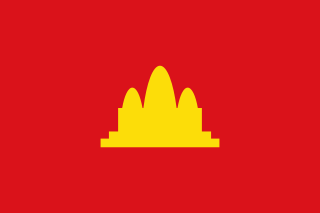
The Khmer Rouge is the name that was popularly given to members of the Communist Party of Kampuchea (CPK) and by extension to the regime through which the CPK ruled Cambodia between 1975 and 1979. The name had been coined in the 1960s by Norodom Sihanouk to describe his country's heterogeneous, communist-led dissidents, with whom he allied after his 1970 overthrow.

Phnom Penh, formerly known as Krong Chaktomuk Serimongkul or shortly known as Krong Chaktomuk, is the capital and most populous city in Cambodia. Phnom Penh has been the national capital since French colonization of Cambodia, and has grown to become the nation's economic, industrial, and cultural center.
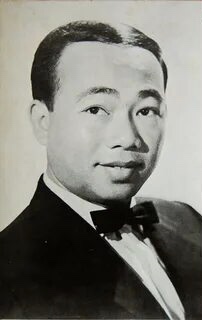
Sinn Sisamouth was an influential and highly prolific Cambodian singer-songwriter from the 1950s to the 1970s.

Son Sen, alias Comrade Khieu (សមមិត្តខៀវ), was a Cambodian Communist politician and soldier. A member of the Central Committee of the Communist Party of Kampuchea/Party of Democratic Kampuchea, the Khmer Rouge, from 1974 to 1992, Sen oversaw the Party's security apparatus, including the Santebal secret police and the notorious security prison S-21 at Tuol Sleng.

Ieng Sary was a co-founder and senior member of the Khmer Rouge. He was a member of the Central Committee of the Communist Party of Kampuchea led by Pol Pot and served in the 1975–79 government of Democratic Kampuchea as foreign minister and deputy prime minister. He was known as "Brother Number Three" as he was third in command after Pol Pot and Nuon Chea. His wife, Ieng Thirith, served in the Khmer Rouge government as social affairs minister. Ieng Sary was arrested in 2007 and was charged with crimes against humanity but died of heart failure before the case against him could be brought to a verdict.

Pailin is a province (khaet) in western Cambodia at the northern edge of the Cardamom Mountains near the border of Thailand. This province is surrounded by Battambang Province, and was officially carved out of Battambang to become a separate administrative division after the surrender of the Ieng Sary faction of the Khmer Rouge in 1996. Pailin is known to much of the world for having long been a stronghold of the Khmer Rouge, remaining under their control long after they were defeated in 1979 and serving from 1994 to 1998 as the capital of the Provisional Government of National Union and National Salvation of Cambodia. Within Cambodia Pailin is known for its natural resources, namely precious gems and timber.
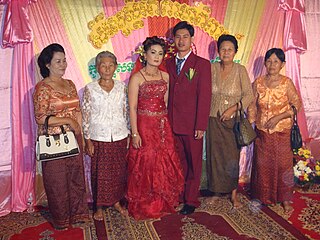
Chinese Cambodians or Sino-Khmers, are Cambodian citizens of Chinese or partial Chinese descent. The Khmer term Khmer kat Chen (ខ្មែរកាត់ចិន) is used for people of mixed Cambodian and Chinese descent while Khmer Chen (ខ្មែរចិន) can mean Cambodian-born citizen of Chinese ancestry. Khmer people constitute the largest ethnic group in Cambodia among whom Chen means "Chinese". Contact with ethnic Chinese people such as envoys, merchants, travelers and diplomats who regularly visited Indochina verifiably existed since the beginning of the common era. However the earliest record of an ethnic Chinese community in Cambodia dates to the 13th century. As a result of a century-long settlement history people with mixed Chinese and Khmer ancestry account for a sizable portion of the population.
General Sosthène Fernandez was the Commander-in-Chief of the Khmer National Armed Forces (FANK) and chief of general staff of the Khmer Republic after Prince Sihanouk was deposed as head of state in 1970. Prior to 1970, he was a prominent politician and a former chief of the police.

Rithy Panh is a Cambodian documentary film director and screenwriter.
Cinema in Cambodia began in the 1950s, and many films were being screened in theaters throughout the country by the 1960s, which are regarded as the "golden age". After a near-disappearance during the Khmer Rouge regime, competition from video and television has meant that the Cambodian film industry is a small one.

Kampuchea, officially from 5 January 1976 Democratic Kampuchea, also described as the Genocidal Regime, was the Cambodian state under a one-party Marxist-Leninist totalitarian dictatorship that existed between 1975 and 1979. It was controlled by the Khmer Rouge (KR), the name popularly given to the followers of the Communist Party of Kampuchea (CPK), and was founded when KR forces defeated the Khmer Republic of Lon Nol in 1975.

Soth Polin is a famous Khmer writer. His maternal great-grandfather was the poet Nou Kan. He grew up speaking both French and Khmer. Throughout his youth, he immersed himself in the classical literature of Cambodia and, at the same time, the literature and the philosophy of the West.

Operation Eagle Pull was the United States military evacuation by air of Phnom Penh, Cambodia, on 12 April 1975. At the beginning of April 1975, Phnom Penh, one of the last remaining strongholds of the Khmer Republic, was surrounded by the Khmer Rouge and totally dependent on aerial resupply through Pochentong Airport. With a Khmer Rouge victory imminent, the US government made contingency plans for the evacuation of US nationals and allied Cambodians by helicopter to ships in the Gulf of Thailand. Operation Eagle Pull took place on the morning of 12 April 1975 and was a tactical success carried out without any loss of life. Five days later the Khmer Republic collapsed and the Khmer Rouge occupied Phnom Penh.
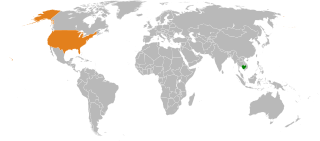
Bilateral relations between the United States and the Kingdom of Cambodia, while strained throughout the Cold War, have strengthened considerably in modern times. The U.S. supports efforts in Cambodia to combat terrorism, build democratic institutions, promote human rights, foster economic development, eliminate corruption, achieve the fullest possible accounting for Americans missing from the Vietnam War/American War-era, and to bring to justice those most responsible for serious violations of international humanitarian law committed under the Khmer Rouge regime.
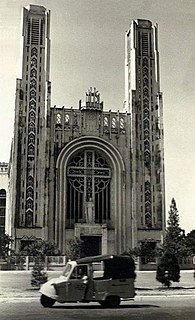
Notre Dame Cathedral, also known as the Cathedral of Phnom Penh, was a 19th-century French Gothic revival church that served as the cathedral of the Apostolic Vicariate of Phnom Penh. It was located in the Russei Keo District of the city on Monivong Boulevard.

The Communist Party of Kampuchea, also known as the Khmer Communist Party, was a communist party in Cambodia. Its leader was Pol Pot and its followers were generally known as Khmer Rouge. Originally founded in 1951, the party was split into pro-Chinese and pro-Soviet factions, as a result of the Sino–Soviet split. As such, it claimed 30 September 1960 as its founding date, then as the Workers' Party of Kampuchea before being renamed the Communist Party in 1966. The party was underground for most of its existence and took power in the country in April 1975 and established the state known as Democratic Kampuchea. The party lost power in 1979 with the establishment of the People's Republic of Kampuchea by leftists who were dissatisfied by the Pol Pot regime and by the intervention of Vietnamese military forces after a period of mass killing. The party was officially dissolved in 1981, with the Party of Democratic Kampuchea claiming its legacy.
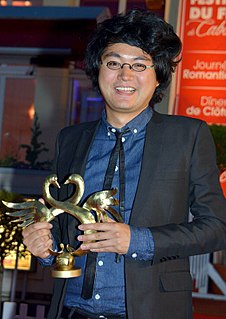
Davy Chou is a Cambodian-French filmmaker. He is the grandson of Van Chann, who mysteriously disappeared in 1969. Davy Chou only discovered in his teens that his grandfather had been one of Cambodia's leading film producers in the 1960s.
The Cambodian humanitarian crisis from 1969 to 1993 consisted of a series of related events which resulted in the death, displacement, or resettlement abroad of millions of Cambodians.
The Fall of Phnom Penh was the capture of Phnom Penh, the capital of the Khmer Republic, by the Khmer Rouge on 17 April 1975, effectively ending the Cambodian Civil War. At the beginning of April 1975, Phnom Penh, one of the last remaining strongholds of the Khmer Republic, was surrounded by the Khmer Rouge and totally dependent on aerial resupply through Pochentong Airport. With a Khmer Rouge victory imminent, the US government evacuated US nationals and allied Cambodians on 12 April 1975. On 17 April the Khmer Republic government evacuated the city, intending to establish a new government center close to the Thai border to continue resistance. Later that day the last defences around Phnom Penh were overrun, and the Khmer Rouge occupied Phnom Penh.
The following lists events that happened during 1975 in Cambodia.
References
- ↑ Milton E. Osborne Phnom Penh: A Cultural and Literary History 2008 p170 The best - selling author of “ airport " novels suffused with sex and violence , Eric Van Lustbader , sets much of his 1987 novel Black Heart in Phnom Penh . As with Durand ' s novel , the rise to power of the Khmer Rouge is an element in the ...
- ↑ Jacques Bekaert Cambodian Diary: Tales of a divided nation, 1983-1986 1997 p.108 "Eric Van Lustbader's Black Heart is a lot more complex ...... The book is not really about Cambodia but at the end tells you maybe a bit more about the Khmer Rouge in the late 1960s and what kind of impact the “ Angkar " ( the organisation ) could have on someone "
- ↑ New York Times review BLOOD AND GUTS, EASTERN DIVISION By Jack Sullivan April 10, 1983
| This article about a thriller novel of the 1980s is a stub. You can help Wikipedia by expanding it. See guidelines for writing about novels. Further suggestions might be found on the article's talk page. |